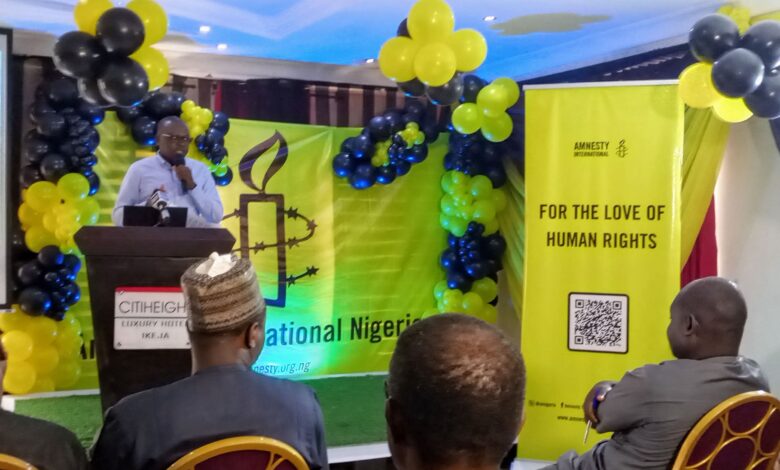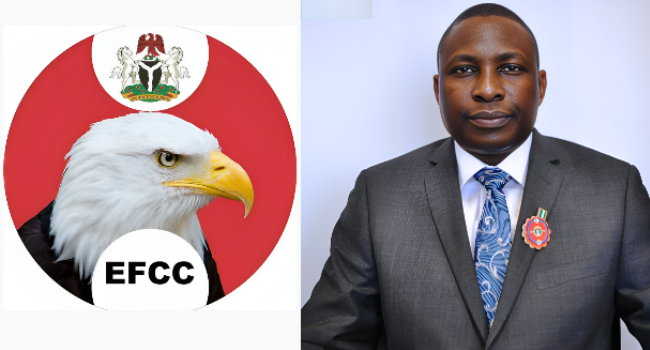How Nigerian govt’s failure created free-for-all reign of impunity in South East region, says Amnesty International in new Report
*Urges probe into killings, as investigative body says generalising cause of atrocities around IPOB/ESN making insecurity in region worse *Emotions as victims of South East crisis recounts experience at stakeholders meeting in Lagos *How unknown gunmen made Lilu Sambisa of South East - Eyewitness. *My newly retired police brother was brutally killed, the scar refuses to depart from us - Victim *Argues killers of people in Igbo Land are known gunmen, urges government to act

By BASHIR ADEFAKA
The persistent failure of the Nigerian government to address the security crisis in the country’s South East Region has created a free-for-all reign of impunity in which numerous state and non-state actors have committed serious human rights violations and killed at least 1,844 people between January 2021 and June 2023.

These were the words of Amnesty International from the press conference address launching its latest Investigated Report it tagged, “A Decade of Impunity: Attacks and Unlawful Killings In South-East Nigeria”, read by its Nigeria’s Country Director, Comrade Isa Sanusi, on Wednesday September 4, 2025.
At the press conference held in Ikeja, Lagos State capital, the Amnesty International leader, who noted how the agitation for the independence of Biafra snowballed into the incessant crisis in the South East Region, said “Our people should be allowed to be whatever they want to be. No one should be suppressed or oppressed.”
Also noting that the Report it said covers from 2015 up till December 2024 took the foremost global human rights research and investigative organisation to out together, Comrade Sanusi believes that, rather than treat it as just another one from an opposition, the Nigerian government should see the report as one that seeks to help it identify what the security issues in the South East really are and provides it with guidance on how to handle the issues both in the region under review and other regions across Nigeria.
Reading from his prepared press conference address tilted, “Nigeria: Authorities must investigate killings and enforced disappearances of thousands in South-East Region”, Isa Sanusi, who revealed that 1,844 people were killed between January 2021 and June 2023, said gunmen killings affected over 400 people in Imo State alone between 2019 and 2021 while hundreds of people were arbitrarily detained and forcibly disappeared creditably mainly to both state and non-state actors, respectively.
He said, “The Nigerian authorities must begin addressing the security crisis in the South-East Region by restoring security and safety of lives and property, as well as carrying out transparent, impartial and effective investigations of killings, assassinations, enforced disappearances and other atrocities committed by state and non-state actors since August 2015.”
According to him, “The report A Decade of Impunity: Attacks and Unlawful Killings In South-East Nigeria, which documents unlawful killings, torture, enforced disappearances and arbitrary arrests at the hands of rampaging gunmen, state-bavked paramilitary outfits, vigilantes, criminal gangs and cult groups in the South-East Region, provides the authorities with adequate leads to open an investigation that will end the impunity and provide victims with justice.
“The Nigerian authorities’ clampdown on pro-Biafra protests from August 2015 plunged the South-East Region into an endless cycle of bloodshed which has created a climate of fear and left many communities vulnerable. Assassinations of prominent personalities and attacks on highways, security personnel and facilities are chilling reminders of the region’s insecurity,” said Isa Sanusi, Director of Amnesty International in Nigeria.
He, however, urged the government saying that it “must stop turning a blind eye to the unlawful killings, arbitrary arrests and detention, torture, enforced disappearances, and destruction of properties in the South-East Region,” adding that, “Authorities must live up to their constitutional and international human rights obligations including by ensuring all suspected perpetrators are brought to justice in fair trials, no matter who they are, and that victims and their families have access to justice and effective remedies.”
He narrated the horrible experiences where victims described how gunmen appeared to their communities and carried out their atrocities unmasked, which the Report noted to have triggered reprisal attacks resulting in death and injury for thousands of residents.
Victims, he said, “described how the gunmen appear, routinely demanding money from communities during burial ceremonies and weddings. Anyone who resists risks being subjected to violent attack during the night, and their house set on fire.”
The Report, which was said to have used names of information volunteers not exactly of them, made reference point to one Ebulie, who survived an attack by gunmen in Ihiala, telling the Amnesty International that, “The “unknown gunmen” are armed – sone cone with guns, cutlasses, and machetes. If they come for an attack, anyone that blocks their way, they will kill them. It has been a terrible situation, people are scared.”
The Amnesty International’s Country Director, Isa Sanusi, therefore, expressed disappointment that, “Nigerian authorities continue to blame the pro-Biafran organisation IPOB (Indigenous People of Biafra) and its militant arm, the Eastern Security Network (ESN) for most of the deadly attacks in the region”, adding that although IPOB and ESN had consistently denied involvement in the activities of the “unknown gunmen” and their camps.
In the meantime, the Amnesty International has called on the Federal Government of Nigeria to, in the view of the highlights captured in its new Report, urgently investigate the widespread killings, enforced disappearances, and other grave human rights violations in the South-East region of the country.
Comrade Isa Sanusi, the organisation’s country director, who made this charge, alleged that security forces and the state-backed Ebube paramilitary outfit committed serious abuses, including extrajudicial killings, arbitrary arrests, torture, and enforced disappearances in the South-East Region, which are now ripe for holistic measure of probe and, by extension, prosecution of sponsors and actors found to be involved in the sad, criminal activities
Sanusi said that the report highlighted how insecurity had disrupted daily life in the region, with sit-at-home orders enforced by the Indigenous People of Biafra (IPOB) and its armed wing, the Eastern Security Network (ESN), paralysed schools, markets, and businesses.
He said that its findings were based on field research and interviews with over 100 people including survivours, victims’ relatives, community leaders, and lawyers between April and November 2023.
“The people paint a picture of communities turned into “ungoverned spaces,” with traditional rulers sacked, residents displaced, and cult groups thriving in the absence of state protection.
“Survivours recounted harrowing attacks in which armed assailants stormed villages, demanded money at public gatherings, and burnt homes of those who resisted,” he said.
According to Sanusi, the federal government must launch a transparent, impartial, and effective investigations into the atrocities, restore security, and provide justice and reparations to victims.
“Authorities must urgently conduct fair, open, and unbiased investigations into reported crimes, emphasising Nigeria’s duty under its constitution and international law to safeguard lives, freedom, and security in the region.
“It must ensure suspected perpetrators are brought to justice in fair trials, no matter who they are, and that victims and their families have access to justice and effective remedies,” he said.
This is necessary as, according to Sanusi, “the atrocities in the South-East Region has now become so rampant and that Nigerian media have become so used to the sad developments that when 30 pe sobs are killed, it doesn’t get to the front page.”
Mr. Maurice Chukwu, a researcher who spoke in-between Sanusi’s welcome remarks and press conference addresses on the research methodology leading to the new Report, informed the stakeholders that the latest Report covers a period between 2021 and December 2024.
According to Chukwu, Amnesty International Nigeria went through all the necessary methods of getting its information, saying, “We speak with the real people, individuals involved. We speak with them directly, survivors, relatives. And we are documenting because our Reports are always balanced. This way we also engaged with my government, the police, military and DSS.”
The Report launch was witnessed by representatives drawn from the media organisations, civil society organisations, security and intelligence agencies as well well ethnic and religious communities.
Thursday’s event of the Amnesty International’s Report launch showed a moment filled with emotions as victims of the South East crisis recounted their experiences at different levels and parts.
One of them narrated how unknown gunmen had made Lilu community in the Aguileri area of Anambra State the Sambisa of the South East, even as another victim recounted how his newly retired police brother was kidnapped, brutally murdered and his body brought back to the house for family to collect, saying that the scars refused to depart from him.
He argued, disagreeing with the narrative that killers of people in the South East are unknown gunmen, saying “Those who are behind this insecurity in our land are not unknown gunmen, they are known people in our communities. , urges government to act
The DEFENDER observes that, from the Amnesty International Report, it is clear that the security crisis in the South East Region of Nigeria has led to significant human rights violations, including unlawful killings, torture, enforced disappearances, and arbitrary arrests. The failure of the Nigerian government to address these issues has created a climate of fear and impunity in the region.
The Report also clearly calls for urgent investigations into the atrocities committed in the South East Region and the prosecution of those responsible. It also highlights the need for the government to restore security and provide justice and reparations to the victims.
The testimonies of victims and survivors paint a grim picture of communities that have become “ungoverned spaces” where armed assailants operate with impunity. The report emphasizes the importance of holding accountable both state and non-state actors responsible for the violence and insecurity in the region.
It is clear that the situation in the South East Region is dire, and urgent action is needed to address the root causes of the crisis and protect the human rights of the people living there. The Nigerian government must take these findings seriously and prioritize the safety and security of all its citizens.
The DEFENDER, which was officially represented at the Report launch on Thursday, reports that Amnesty International is an international organisation, funded by individuals who share the same philosophy of fairness, justice and unbiased researches and investigations with it, worldwide, in its commitment campaigning to protect human rights of individuals and groups across the world.









